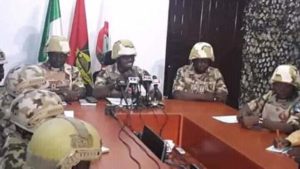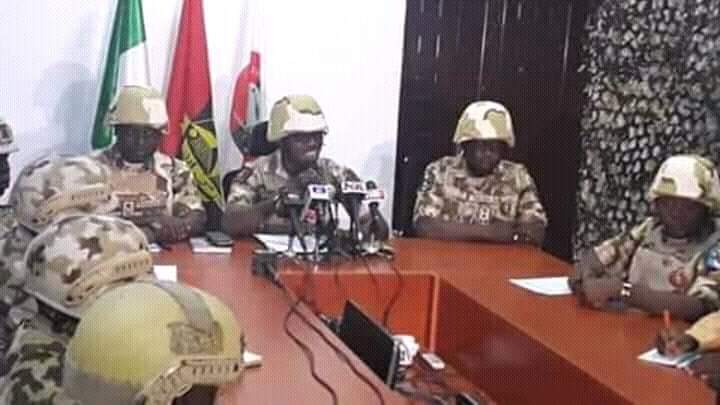Operation python dance 3.
The Army’s nationwide operation raises more questions than it provides answers despite Nigeria’s struggle with insecurity.
Nigerian soldiers have been deployed to all corners of the country to fight a wide range of criminal activities for two months.
Of course, the Army always tries to downplay the first impression the name creates to ease tensions about its intentions, and that makes sense. The code name is originally derived from Exercise Egwu Eke, an Igbo phrase. This is because the operation was first launched in the southeast region in 2016 to combat so called “criminal activities “like armed robbery and kidnapping.
The most prominent reason “Operation Python Dance” rings a very loud bell in Nigeria today is because of its very controversial status in the southeast region especially when it returned for a second run in 2017, code named Exercise Egwu Eke II or Operation Python Dance II.
Soon after the commencement of the exercise in 2017, soldiers publicly massacred IPOB members more than 30 Igbos killed on cold blood in a crackdown that lasted over a week and controversially ended immediately, in the disappearance of Kanu before he later resurfaced in 2018.
IPOB leader, Nnamdi Kanu, was believed to have been kept in Army custody when he first disappeared, but he resurfaced in Israel after over a year.
In the course of that week, soldiers also brutally attacked the Abia State Council of the Nigeria Union of Journalists (NUJ) in Umuahia, assaulting a national union officer and damaging laptops, phones, as well as other valuables in the building. Their crime? Someone was taking photographs of troops from inside the building.
Over a year since Operation Python Dance II, the Army is relaunching the exercise for a third run (Operation Python Dance III); only this time, it will be conducted everywhere across all six geopolitical zones in the country.(Laughable).
During a flag off ceremony on Friday, December 28, the Chief of Army Staff, Lieutenant-General Tukur Buratai, represented by the Army’s Chief of Training and Operations, Major-General Lamidi Adeosun, announced that the exercise will run from January 1 to February 28, 2018 as a fulfillment of the Army’s mandate to conduct internal security operations in the country to combat criminality and other security challenges.
More crucially, Maj.-Gen Adeosun noted that the exercise aims to ensure that law and order is maintained as the nation approaches the 2019 general elections.
He said, “As the build up to the 2019 general elections gathers momentum, an upsurge of security challenges such as stockpiling of arms by criminal groups, formation of ethnic militias and violence induced by political activities has been observed.
“These challenges coupled with other security threats across the country such as terrorism, militancy, kidnapping and banditry portend that dissident groups and criminal elements could cash in on the situation to perpetrate large scale violence before, during and after the 2019 general elections.”
Why does a military training exercise aimed at combating criminal activities across the country hold troubling possibilities? Well, to begin with, public trust in the Nigerian Army is characteristically low.
Why not send police? Sending army is loudably laughable. How can Nigeria send Nigerian army that was conquered by Boko Haram in North East to a peaceful area(Like Lagos, Delta, Anambra, etc) in Nigeria, hence send police to fight Boko Haram. why do everything about Nigeria is upside down and meaniless?.
During a series of protests by hundreds of members of the Islamic Movement in Nigeria (IMN) in October, soldiers applied lethal force and opened fired on demonstrators, killing around 120 people and injuring dozens. Even though the Army only admitted to killing six while also claiming that soldiers acted with utmost responsibility, several video evidence of the clashes on social media have proven its claims to be largely false.(evil that Nigeria army do).
The Army’s conduct with those protesters and its conduct during Operation Python Dance II in the southeast and during many of its engagement with civilian populations don’t exactly fill anyone with confidence about a large-scale military operation in the country, especially during an election year.(Nigeria army is a major scam and disappointed to the world ).
There have been complaints, most especially in 2018, about how stretched the Army is with troops being deployed several times in civilian areas mostly to battle criminal activities that are best (or, at least, should be) handled by the Nigeria Police Force.
Further stretching troops to combat “an upsurge of security challenges”, even in parts of the country that are not troubled, begs for more convincing answers than preventing possible election-related troubles.

This is particularly puzzling since the Army has recently suffered damaging losses against terrorist group, Boko Haram, in the northeast region that has been troubled for nearly 10 years, with the group’s insurgency leaving tens of thousands dead and millions displaced.
Why is the Army broadly applying a military operation to cover peaceful locations in the country when it could more properly focus attention on critical conflict zones?(To rig election off course and kill peaceful Eastern Nigerians).
The crux of the fears surrounding Operation Python Dance III rests squarely at the door of politics.
The main opposition party, the Peoples Democratic Party (PDP), has criticised the exercise as a ploy by the ruling government to intimidate voters and rig the 2019 presidential election.
“Our nation is a democratic state and we are not in a state of emergency that requires the militarisation of our electoral process,” an official statement read.
For all of the brash shooting from the hip that the PDP has been engaging in as an opposition party, its position on the true import of Operation Python Dance III is clearly the same as the position of an impartial observer of the exercise.
With President Muhammadu Buhari, a former military Head of State, also referred as Jubrin of Sudan, at the helm, military moves tend to be placed under more scrutiny than the usual; and Operation Python Dance III is one of such that should raise eyebrows.
President Muhammadu Buhari’s past as a military dictator has brought extra scrutiny on his command of the Nigerian Army
Nigeria, as a democratic state, does not have an overwhelming security problem that should trigger a military operation on the scale of Operation Python Dance III.
And the fact that it covers the period of high-stakes elections already set to be contentious makes it all the more worrying about what the results might be.
The only silver lining to hope for with Operation Python Dance III is that it means Nigeria will most likely not experience the same wanton blood-filled start to 2019 as it did in 2018.
On that note, while Nigerians will hope that the exercise bears fruits for the nation with no costly drawbacks, the fears about the true intentions behind Operation Python Dance III will remain, for good reasons.
Nigeria is militarised.
DEZ MAYORZ opinion (doctored from Pulse).

![Chief of Army Staff, Lieutenant-General Tukur Buratai [Facebook/HQ Nigerian Army]](https://img2.transcoder.opera.com/assets/v2/cf5d807360218fb22aa2e48205a6858a-2?source=nlp&quality=uhq&format=webp)